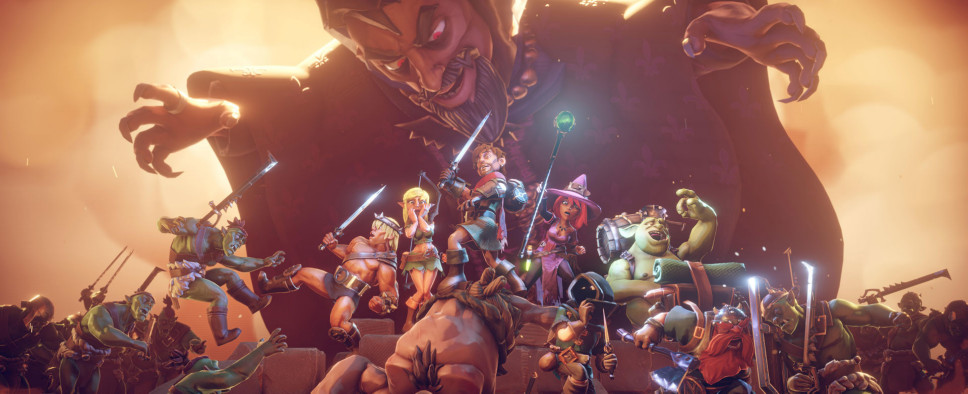The Dungeon of Naheulbeuk: The Amulet of Chaos Review
-
Category: ReviewsHits: 13076

Article Index
Introduction
The Dungeon of Naheulbeuk is a French audio series built around the idea of poking fun at all sorts of fantasy and RPG tropes. It follows a party of underqualified adventurers on a series of epic quests that have a tendency to go off the rails. The Dungeon of Naheulbeuk: The Amulet of Chaos is the series’ video game adaptation described as an epic and challenging tactical RPG filled with humor, surprises and silly encounters.
When the game was initially announced, I was mostly just mystified by the fact that audio dramas, or audio comedies in this case, were still a thing. But in the end, this project managed to pique my curiosity, since a party-based RPG that combines turn-based tactical combat with light-hearted comedy is very much right up my alley.
Going for the Eyes on Hell’s Kitchen
From my understanding, the game follows the first season of the audio series where the party has to retrieve an unpronounceable statuette from the eponymous dungeon. This ambition quickly loses its urgency when the heroes find themselves cursed by the once again eponymous amulet. Eponymous, according to the game’s snarky and oftentimes groan-inducing item descriptions, is a word the writers really like.
But, back to the dungeon. It’s not so much a dungeon as it is a tower populated by all sorts of zany creatures. You have your drunken orcs, ice-skating goblins, undead librarians, and so on. There’s even a dark elven rock band in there somewhere. In an attempt to lift their curse, the heroes will have to deal with all these creatures with varying degrees of prejudice.
This brings us to the game’s core loop. You enter a floor, get a feel for its overall theme, and start clearing it out room by room while looting everything that’s not bolted down. Some of the rooms will treat you to a combat encounter, and occasionally you’ll get to solve some simple puzzle or a riddle.
Overall, the game is fairly linear, but occasionally you do get to explore some side passage. Side quests are also way more numerous than it initially appears, you just have to regularly revisit the game’s NPC hubs to actually pick them up. This results in a fair bit of mildly annoying backtracking, though.
All of this is interspersed with frequent conversations between the heroes, and their interactions with the dungeon’s denizens. And while a lot of the game’s humor didn’t exactly land for me, these interactions never failed to amuse.
The core of your party consists of the Ranger, the Barbarian, the Thief, the Wizardess, the Ogre, the Dwarf, and the Elf. These serve as both their names and their classes. Later on, you get to recruit the Priestess, the Paladin, or the Minstrel. You can only add one of them to your party, and the choice is permanent.
Most of these characters seem to come directly from the audio series, and I'm assuming that's why it's so fun to listen to them bicker, despite their less than original archetypes. The Barbarian, for example, is unashamedly an over-the-top version of Arnie's Conan. The Dwarf is short, mean, and belligerent. The Elf is perky to the point of being nauseating. You get the idea.
But all of it is played with such honest enthusiasm, you can’t help but root for these characters and wonder what trouble they’ll get themselves into next.
However, once we leave our audio series party and venture into the video game realm of talking to NPCs, getting side quests, and what have you, everything stops looking quite so rosy. The writers seem to love their jokes a little too much and keep iterating on them for no good reason.
There’s Gordon Ramsay, for starters. I saw the celebrity chef mentioned numerous times in different contexts. The infamous Skyrim arrow to the knee joke also makes an appearance. Twice. And don’t even get me started on Baldur’s Gate and the inarguable importance of going for the eyes. All this low hanging fruit stuff feels beyond lazy.
Maybe it’s that thing with comedy being subjective, but to call the game’s humor uneven would be an understatement. The same can be said about the voice acting. The English version features some prominent actors, like Felicia Day, some perfectly acceptable and fun performances, and some real stinkers, all side by side.
And in general, uneven is the name of the game here. This particular title has a fascinating ability to combine great ideas with some really stupefying blunders.

